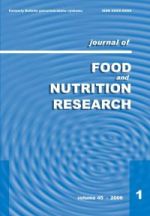Vedecký časopis - archív
Journal of Food and Nutrition Research
Súhrny čísla 1 / 2015
Yu, S. – Jiang, L.-Z. – Kopparapu, N. K.
Impact of soybean 7S globulin content on thermal and retrogradation properties of non-waxy maize starch
Journal of Food and Nutrition Research, 54, 2015, č. 1, s. 41-49
Shifeng Yu, College of Food Science, Northeast Agricultural University, Harbin 150030, China. Tel: +86-0452-2742735, fax: +86-0452-2742746, e-mail: yushifeng2013@126.com
Received 15 April 2014; revised 17 May 2014; accepted 3 June 2014; published online 16 January 2015
Súhrn: In the present study, thermal and retrogradation properties of non-waxy maize starch/soybean 7S globulin mixtures with different water content were evaluated by differential scanning calorimetry. The thermal results showed that soybean 7S globulin can increase onset, peak temperatures and thermal enthalpy of maize starch. The onset and peak temperatures of mixtures are positively related to soybean 7S globulin content. The thermal enthalpy is positively correlated to soybean 7S globulin content when water content is less than 50%, however, it is negatively related to soybean 7S globulin content when water content is higher than 50%. On the other hand, soybean 7S globulin can retard maize starch retrogradation, since the retrogradation enthalpy is negatively correlated to soybean 7S globulin content when water content is higher than 50%, while it is positively related to water content during storage. In addition, maize starch retrogradation enthalpy is the highest when water content of mixture is 50% during the storage period. Therefore, controlling soybean 7S globulin content and water content of mixtures is effective in increasing or decreasing starch gelatinization and retrogradation. These findings may have important application for production of high quality maize starch-based food products.
Kľúčové slová: maize starch; 7S globulin; thermal property; retrogradation; soybean
Na stiahnutie:
jfnr20151p_4.pdf (PDF, 364.46 Kb, 1705x)










